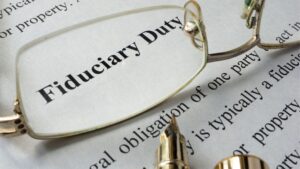
New York Law imposes a heightened standard of care on people who occupy specific positions of trust and responsibility. These legal requirements are known as fiduciary duties. Fiduciary duties are legally enforceable and help hold professionals to a high standard. Due to the harm violating a professional relationship can cause, victims can file suit if someone breaches a fiduciary duty.
At the Law Office of Andrew M. Lamkin, P.C., we know how important trust is when carrying out the affairs of an estate. Few positions require a greater degree of trust than that of an estate executor or administrator. Beneficiaries are often in the dark about much of what happens behind the scenes of estate administration. They rely on executors, administrators, and trustees to perform their duties with honesty, candor, and competence.
When someone involved in estate planning or administration breaches their duties, the Law Offices of Andrew M. Lamkin can help hold them accountable. Our firm’s primary focus is estate law, and we have experience identifying breaches of fiduciary duties and holding the perpetrators accountable. Contact us today and schedule a consultation.
What Is a Fiduciary Duty?
A fiduciary duty is a specific legal requirement imposed on certain professionals and others in positions of trust. There are several types of fiduciary duties, but they are all meant to ensure that a fiduciary is acting in the best interests of their clients. And if they breach those duties, fiduciaries are liable for any damage their breach causes. Further, if a fiduciary uses their position to promote their own self-interests, they might be liable for any profits they make.
Can I Sue for Breach of Fiduciary Duty?
If someone breaches a fiduciary duty towards you, you can sue them for the resulting damages. To succeed with a breach of fiduciary duty claim, you must prove the following three elements:
- A fiduciary relationship existed between you and the defendant;
- The defendant breached their fiduciary duty towards you; and
- You suffered economic harm, or the defendant received a financial benefit from the breach.
If you can prove all three elements, you should be able to recover damages.
Fiduciary Relationship
Many different relationships create fiduciary duties in New York. Most fiduciary relationships are explicitly created by New York statute or through contracts. Sometimes fiduciary relationships are inferred based on the type of transaction and the circumstances surrounding the relationship between the parties. Proving the existence of a fiduciary relationship that is not explicitly created through statute or contract is often very difficult.
The Consolidated Laws of New York, Chapter 17-B is the Estates, Powers, and Trusts chapter. Section 1-2.7 defines a fiduciary. This definition includes:
- Personal representatives as defined by law; and
- A person “who is designated by the creator or by the court to act as an assignee for the benefit of creditors or a committee, conservator, curator, custodian, guardian, trustee or donee of a power during minority.”
The term personal representative is defined in Section 1-2.13 as “a person who has received letters to administer the estate of a decedent.” This definition includes executors and administrators of an estate. Trustees also have fiduciary duties under New York Law.
Breach of Fiduciary Duty
Whether a defendant breached a fiduciary duty depends upon their actions and the duties they owed you. Different types of fiduciary duties carry different requirements. For example, a trustee owes duties to administer the trust solely in the beneficiary’s interests and to avoid any conflict of interest. If a trustee used a trust’s funds to invest in their own business, they likely breached both duties. Due to the many different types of potential breaches, it is essential to work with an experienced estate attorney to prove a breach of fiduciary duty.
Economic Injury or Economic Benefit
Finally, a plaintiff must show that they suffered an economic injury from the breach or that the fiduciary unfairly profited. Common financial injuries include:
- Lost profits,
- Monetary damages,
- Unpaid benefits,
- Unnecessary losses for a trust or estate, and
- Other economic damages to the plaintiff.
If the defendant unfairly profited from self-dealing, you should be able to recover their profits. New York law calls this form of recovery equitable relief or profit disgorgement. The economic damage or self-dealing profit must result from the fiduciary breach.
Types of Fiduciary Duties
Depending on the fiduciary relationship, a fiduciary might owe several duties to a principal. The three primary responsibilities that most fiduciaries owe their clients include the duty of loyalty, the duty of good faith, and the duty of care. A fiduciary might also have other responsibilities.
Duty of Loyalty
The duty of loyalty is a requirement that a fiduciary must act in the best interest of their principals. This responsibility means putting their client’s interests above their own interests and the interests of others. For this reason, the duty of loyalty requires that fiduciaries take steps to avoid conflicts of interest as they fulfill their responsibilities. This requirement includes avoiding potential conflicts between different clients.
Duty of Good Faith
The duty of good faith and fair dealing puts several requirements on a fiduciary. Good faith means that the fiduciary must act honestly and disclose any material facts or potential conflicts of interest to the principal. It also means the fiduciary must make decisions they genuinely believe will promote the best interests of their client.
Duty of Care
The duty of care requires a fiduciary to act with the thoughtfulness and caution of a reasonably prudent person when carrying out their responsibilities. Depending on the relationship, the standard might be more demanding. For example, an attorney must act with a higher standard of care different than an average person.
Other Duties
The law might impose other explicit duties on fiduciaries based on their positions. One example is that corporate directors have a responsibility to act lawfully and avoid causing their corporation to act in an unlawful manner. An experienced attorney can help identify other duties a fiduciary might owe.
Should I Sue for Breach of Fiduciary Duty?
The decision to sue for a breach of fiduciary duty is deeply dependent on the facts of an individual case. Individuals can also pursue other options, such as settlement negotiations, before filing a lawsuit. At the Law Offices of Andrew M. Lamkin, P.C., we can closely examine your case’s facts and help guide you through this decision. Contact us today!


